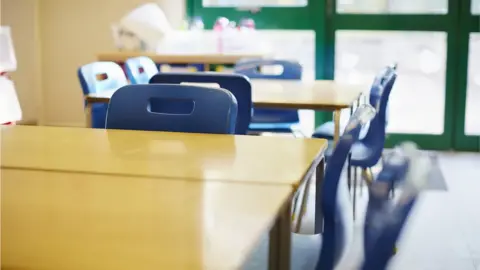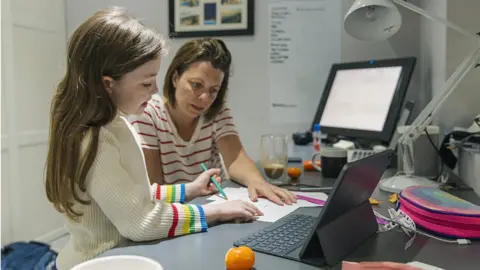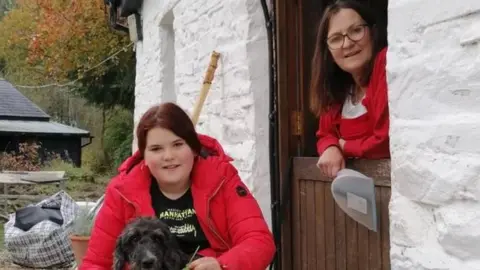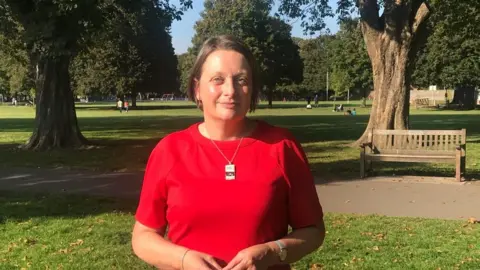Covid and home schooling: Children 'flourishing' as numbers rise
Some parents could not wait to get their children back to school after the first coronavirus lockdown.
But Louise's two children remain at home - initially because she was shielding, but increasingly because "they are flourishing".
They are among 806 children removed from school registers by parents in Wales between March and September this year - up almost 50% since last year.
The Welsh Government said it had given councils £400,000 for home-schooling.
But some parents teaching their children at home have called for more support.
 Getty Images
Getty ImagesFigures obtained by BBC Wales Live show 552 children were "deregistered" from school between March and September in 2019. In 2018, the figure was 466.
The actual number will be higher as six local authorities have not given their figures.
Local authorities said children were being deregistered for a number of reasons, including anxiety, coronavirus and lifestyle choice.
'Afraid and anxious'

Louise, 38, from Abergavenny, said her daughter Orlena struggled with learning at home during the first lockdown, "but when it came to the children going back to school I was afraid and anxious".
"It was the unknown with Covid - it just filled both me and them with uncertainty."
Louise suffers with an autoimmune disease which means she would be likely to be "very sick" if she caught coronavirus, which made her children "extremely concerned about bringing it home".
"So at the end of August we just decided they weren't going to go back for now," she explained.
Armed with online resources loosely based around the suggested curriculum for their age, Louise deregistered her children in September.
She has been surprised by how readily Orlena, 12, and nine-year-old Roy have adapted to their new style of education.
'They are flourishing'

"We were just plodding along with school - I was aware Orlena was slow in some things and that Roy was a bit rebellious," Louise said.
"Home-educating has helped me see their weaknesses and work on them.
"I ask them how they feel about going back to school and both of them say they don't get as much one-on-one with teachers as they have 30 children to deal with.
"They are flourishing now with someone having the time to sit with them and do things. I do learning through play, and if something doesn't tickle their mind I don't force them to do it."
She said she now sees home education as a potentially long-term arrangement for the children, with the possibility of them studying for their GCSEs at home.

"If the children want to go back once it is safe for them to do so, they can. But I have decided to leave that up to them," Louise added.
"We might look at flexi-schooling, where they go to school for part of the week, but spend a couple of days being home educated too."
Although she is sometimes unable to teach them because of her illness, Louise said help from friends, her children's desire to learn and online resources makes home education possible.
She said: "There hasn't been any support, the only support has been through other home-educating parents online."
Monmouthshire council said it worked with home-schooling parents "in line with Welsh Government guidance", and that no parents had been in touch to express disappointment with the level of support.
 Getty Images
Getty ImagesFreedom of Information requests by Wales Live to local authorities found there were a total of 2,250 children currently being home educated in Wales. In 2019 there were 2,171 while in 2018 that figure was 1,878.
The number may be higher as it is not compulsory for parents to register their children as being home schooled if they have never attended school.
Lockdown has been like an "extended free trial" for home schooling and the "biggest single boost in home education ever", according to Alastair Lawson, from education resource website Twinkl.
But home schooling has been more challenging for other parents.
'Can't describe how hard it is'
 Family photo
Family photoPolly, from Ceredigion, started home schooling her 12-year-old daughter Meg in September to shield her husband - who previously had a kidney transplant - from the virus.
"I can't describe how hard I find it having to be teacher, mother, best friend," said Polly.
"I've had no official support. Ceredigion council were very supportive when we chose to withdraw her from education - they didn't oppose it and we didn't have any fines and I think we had one letter with a link to online resources."
Ceredigion council said it was "not in a position to direct what learning takes place" at home, but it was "eager" to help families find the right learning resources.
She said the experience has made them a lot closer as a mother and daughter, but added: "Some sort of mentoring for me would really help. Some sort of guidelines."

Plans to set up a compulsory register of children being home schooled were shelved by the Welsh Government in June due to the pandemic.
As a result, Children's Commissioner Sally Holland has launched a review into regulations surrounding home schooling to see if it should be better regulated.
A Welsh Government spokeswoman said it was updating a leaflet for home-educating parents concerned about coronavirus, and they needed to be aware of the implications of home-schooling.
She said: "We're aware that some parents may have made the decision to remove their children from school due to Covid-related fears, however, we encourage schools and local authorities to work together with families through a supportive approach to enable a return to school during these challenging times."
The spokeswoman added the Welsh Government had allocated £400,000 to local authorities this year to support home-schooling families, which is "unique to Wales".
Watch Wales Live on BBC One Wales at 22.35 GMT on Wednesday, and afterwards on BBC iPlayer.
